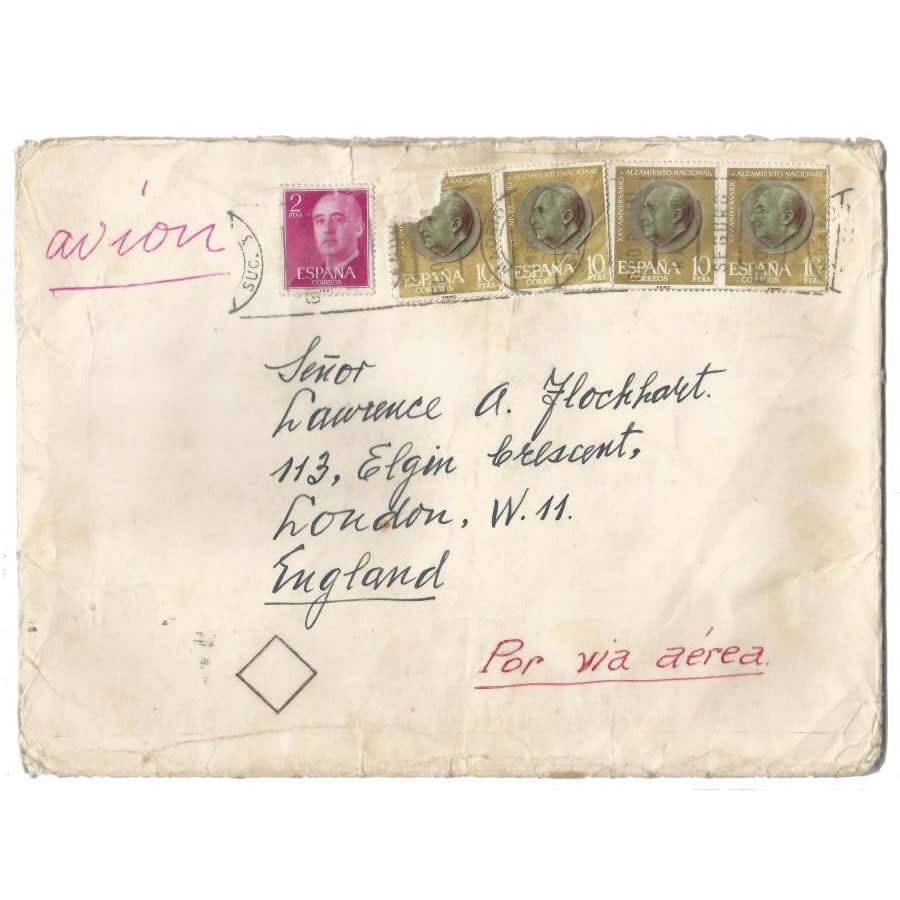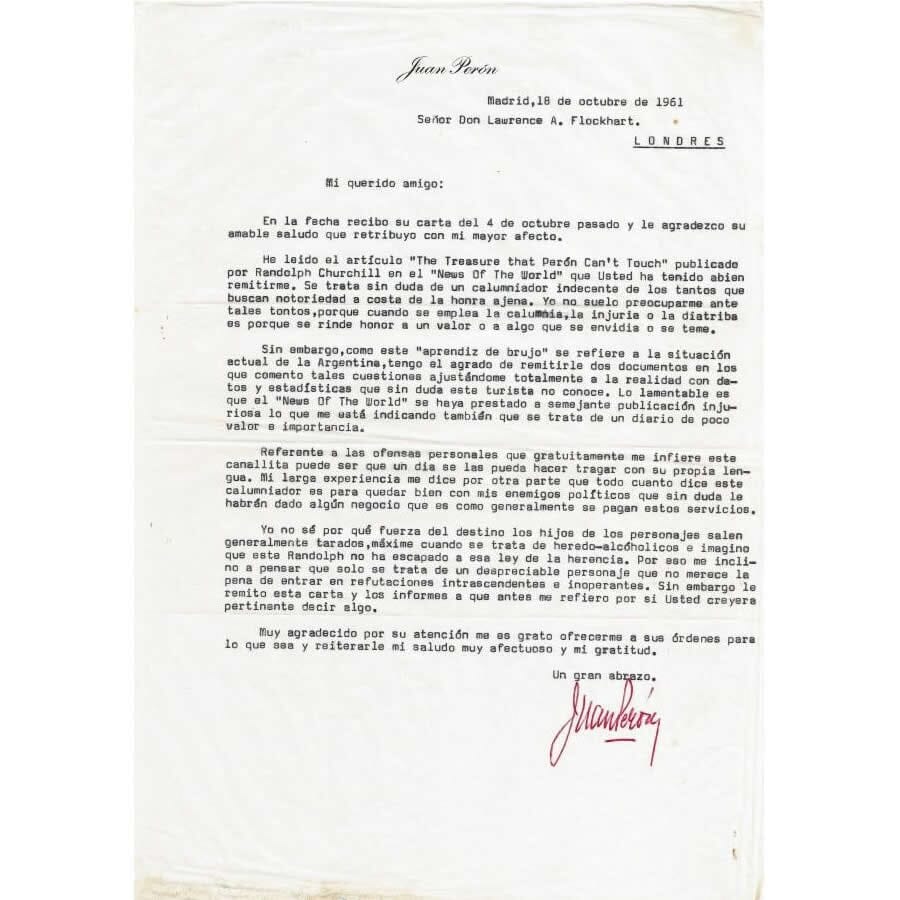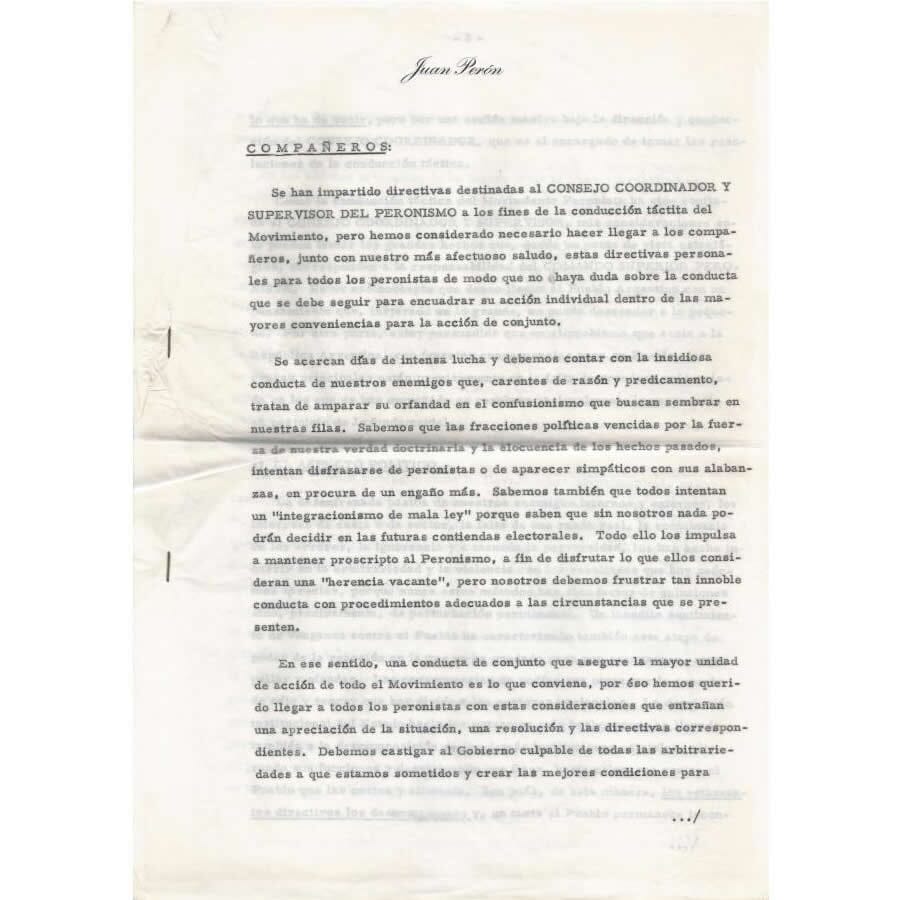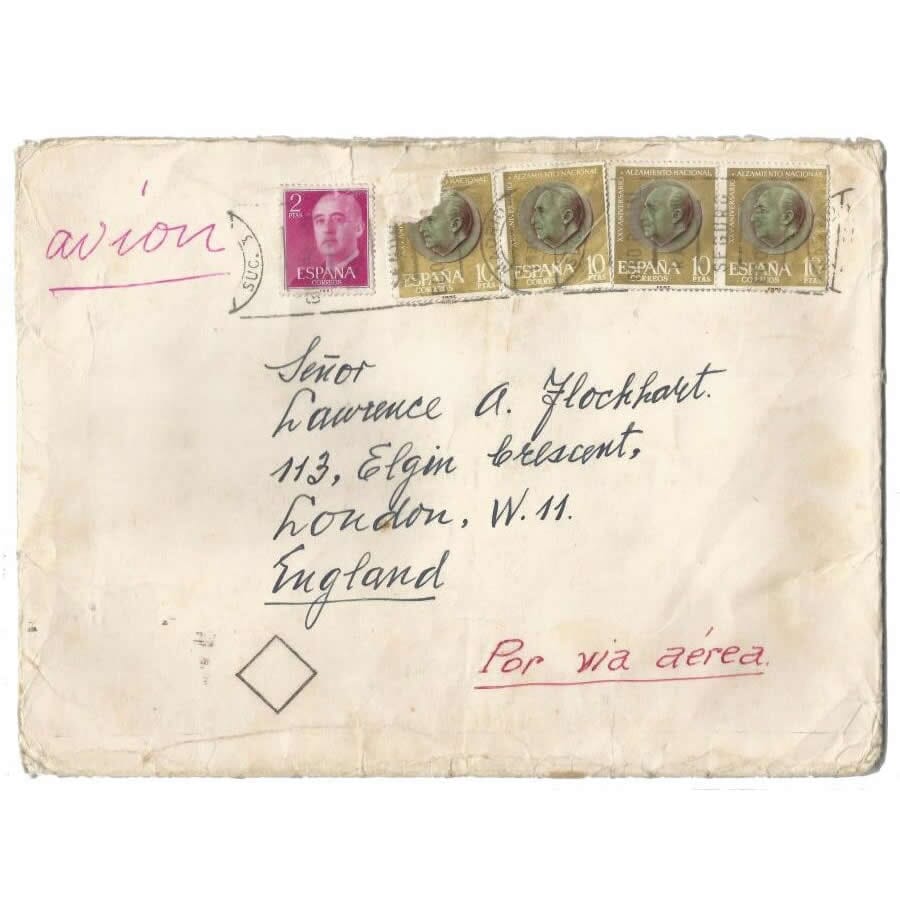Letter signed by Juan Perón (1961)
Letter signed by Juan Perón (1961)
Free shipping
Comes with Certificate of Authenticity and Digital Warranty ©
Couldn't load pickup availability
> This item is no longer in the catalog, see available documents here <
In 1961, Argentine President Juan Perón, exiled and very irritated by an English journalist, criticizes and counter-argues.
- Typed letter signed in red by Juan Perón to Don Lawrence A. Flockhart, in London.
- One page, with the original envelope, its stamps and heading "Juan Perón".
- In Spanish.
- 21 cm x 29.5 cm.
- Madrid, October 18, 1961.
- Good general condition, fragile paper.
- Unique piece.
My dear friend:
On this date I received your letter of October 4th last and I thank you for your kind greeting, which I reciprocate with my greatest affection.
I read the article “The Treasure that Perón Can't Touch”, published by Randolph Churchill in the “News Of The World”, which you sent me. Without a doubt, he is an indecent slanderer, one of the many who seek notoriety at the expense of the honor of others. I do not usually worry about these fools, because when they use slander, insult or accusation, it is because they honor a value or something that they fear or envy.
However, since this “apprentice wizard” is referring to the current situation in Argentina, I would like to send you two documents in which I comment on these issues, fully adapting myself to reality through data and statistics that this tourist is undoubtedly not familiar with. The regrettable thing is that the “News Of The World” has lent itself to this defamatory publication, which also shows me that it is a newspaper of little value and importance.
As for the personal insults that this scoundrel gratuitously directs at me, perhaps one day I will be able to swallow them with his own tongue. My vast experience tells me, on the other hand, that everything this slanderer has said is to get in the good graces of my political enemies, who will undoubtedly have given him some business; that is usually how these services are paid for.
I don't know by what force of fate the children of important people usually turn out to be idiots, especially when it comes to alcoholic inheritance, and I imagine that this Randolph has not escaped this law of inheritance. For this reason, I am inclined to think that he is a despicable character, who is not worth entering into irrelevant and ineffective refutations. Nevertheless, I am sending you this letter and the reports to which I previously referred, in case you think it is pertinent to say something.
I am very grateful for your attention, I am pleased to be at your service for whatever it may be and I reiterate my affectionate greeting and gratitude.
A big hug.
Juan Peron
- Large typed document in 10 parts, written by Juan Perón for his "compañeros" in Argentina.
- This is a complete and incisive summary of the current political, social and economic situation in Argentina, as well as the decline of the “so-called ruling class”, followed by “Where do we go from here?”.
- 64 pages, with the heading "Juan Perón".
- In Spanish.
- ~ 21cm x 29cm.
- Madrid, October 1961.
- Good general condition, fragile paper
- Unique piece.
Juan Perón (1895 - 1974) was president of Argentina between 1946 and 1955 and between 1973 and 1974. The military coup in September 1955 forced him into exile until 1973 in Paraguay, Venezuela, Panama, the Dominican Republic and for some time in Madrid, where he wrote this letter and this document.
With a strong personality cult and close to the ideas of Hitler and Mussolini during the Second World War, Perón is considered a dictator by historians. However, the main difference from fascism is that the Peronist regime maintained a multi-party system and respect for the Constitution, such as the separation of executive, legislative and judicial powers. Despite his authoritarian and highly repressive stance, Juan Perón was permanently acclaimed between 1945 and 1955, through several elections that confirmed the popularity of his policy called the "Third Way", which sought to be an alternative between capitalism and communism .
Another reason for her popularity, Juan Perón's second wife, Eva or Evita to others, contributed greatly to the social image of Peronism among the poorest classes of the population, through her work with the sick, the elderly and orphans. Although her precise role in the politics of Perón's first term remains controversial, Eva Perón certainly introduced issues of justice and social equality into the national discourse.
In 1961, after Evita's death, Juan Perón married the cabaret singer María Estela Martínez, who became his third wife and successor in office. Argentina in the 1950s and 1960s was marked by frequent changes of government (eight heads of state from 1955 to 1973), low economic growth, continuous social pressure and two military dictatorships ("the Libertar Revolution" in 1955-58 and the "Argentine Revolution" of 1966-1973). In exile, Juan Perón continued to observe and analyze the situation in Argentina and communicate with Argentine and foreign allies and supporters.
It is in this context that Juan Péron wrote this letter to Don Lawrence A. Flockhart, an 18-year-old English fascist and Peronist. In it, Perón comments on the article "The Treasure that Perón Can't Touch" by Randolph Churchill, published in the newspaper "News of the World" sent by Flockhart. He vigorously criticizes the author, calling him a "scoundrel" and describing the newspaper as "of little value and importance". To explain his reasoning, he encloses a manuscript in which he analyzed the economic situation of Argentina with "data and statistics".
Here we can appreciate Perón's style and emotion in this important year of 1961, when, certainly frustrated by exile, he explains his historical vision in a very relevant way in the second document. Interesting details are also the personalized heading and the signature in red of one of the most important Latin personalities of the 20th century.



Assine nossa newsletter
Achamos tesouros todo mês. Seja o primeiro a saber.



